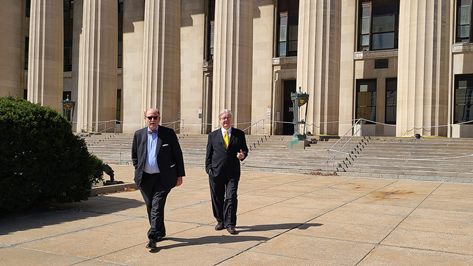
by Sherman Smith, Kansas Reflector
As Wyandotte County District Judge Bill Klapper wandered into his overflowing courtroom Monday before the start of a high-profile redistricting trial, he asked court observers and attorneys if they ever go to horse races.
Right before they start, Klapper said, the atmosphere is “all nerves and adrenalin.”
“The palpable energy in this room right now is just fantastic,” Klapper said.
On one side of the room: An army of liberal attorneys representing voters in three separate cases. They contend the GOP-dominated Legislature ignored redistricting guidelines and public comments to draw new congressional boundaries that favor Republicans.
The other side: Attorneys hired by the state of Kansas to defend Secretary of State Scott Schwab and Wyandotte County election commissioner Michael Abbott, whose names appear on the lawsuit as a formality because of the offices they hold. These attorneys argue the Legislature merely exercised discretion in adapting boundaries to account for a decade of population growth in Johnson County.
At issue: A map known as Ad Astra 2 splits the Kansas City metro area along Interstate 70, separating the heavily Democratic northern part of Wyandotte County from Johnson County and the 3rd District, and places Lawrence into the same 1st District as rural counties that border Colorado, about 385 miles west of the college town.

The Kansas Supreme Court tasked Klapper with hearing a novel legal challenge about whether the Kansas Constitution contains protections against dividing communities of color and partisan gerrymandering. They are treading new ground because a U.S. Supreme Court decision in 2019 determined federal courts should have no say on the topic, upending decades of precedent.
Abha Khanna, an attorney for the D.C.-based Elias Law Group, said in opening arguments that Republicans “used the redistricting process as a power grab” designed to silence Democrats and minority voters in increasingly competitive areas of the state.
GOP leaders relied on “unprecedented and abusive tactics” to twist every arm needed to override a veto of the congressional map by Gov. Laura Kelly, Khanna said, after systemically dividing young voters and people of color so they would not have their voices heard.
Khanna said public comments by former Senate President Susan Wagle in September 2020, when Wagle outlined how Republicans could draw congressional districts to ensure four Republicans were sent to Congress, were evidence that Ad Astra 2 was designed to maximize partisan gains.
The “equal protection” clause on the state constitution doesn’t allow legislators to target Democratic voters or take voting power away, Khanna said.
Tony Rupp, an attorney representing the state, said Wagle wasn’t even a member of the Legislature when the redistricting process started in 2021. And even experts hired by plaintiffs in the case have produced voting projections that show U.S. Rep. Sharice Davids, the only Democrat from Kansas in Congress, has a 62% chance of hanging onto her 3rd District seat.
If the idea was to pack districts with Republican voters, Rupp said, the Legislature could have done so more efficiently. He also pointed out that Republicans have won 19 of 21 congressional races, including one special election, based on the existing map.
The census showed a 78,000 population increase in Johnson County. As a result, Rupp said, there are too many people to keep all of Johnson and Wyandotte counties together in a single district. Rupp said voters elected legislators to make decisions for them, and those legislators chose to keep Johnson County intact.
Rupp asked Klapper, the judge, to “stay out of the political thicket, and do not disenfranchise the elected representatives.”
Another attorney for the state, Gary Ayers, unsuccessfully tried to persuade Klapper to block “expert” witnesses from testifying in favor of the voters who sued.
Ayers argued there is no standard in state law or constitution for the redistricting of maps. A “community of interest” can’t be measured, Ayers said.
Ayers also asserted that the relocation of Black and Latino voters wasn’t the real issue with redrawn congressional boundaries.
“The plaintiffs don’t like the type of white voters they have in the district, and they don’t know how to quantify that,” Ayers said.
The trial is expected to last up to two weeks. Klapper’s ruling is expected to be appealed, regardless of his decision.
The Legislature last week passed an additional set of maps that redraw Senate and House districts, as well as the state board of education seats. Gov. Kelly has yet to veto or sign that legislation, which also could be subject to legal challenges.
Kansas Reflector stories, www.kansasreflector.com, may be republished online or in print under Creative Commons license CC BY-NC-ND 4.0.
See more at https://kansasreflector.com/2022/04/04/nerves-and-adrenalin-as-kansas-congressional-redistricting-trial-begins/.
